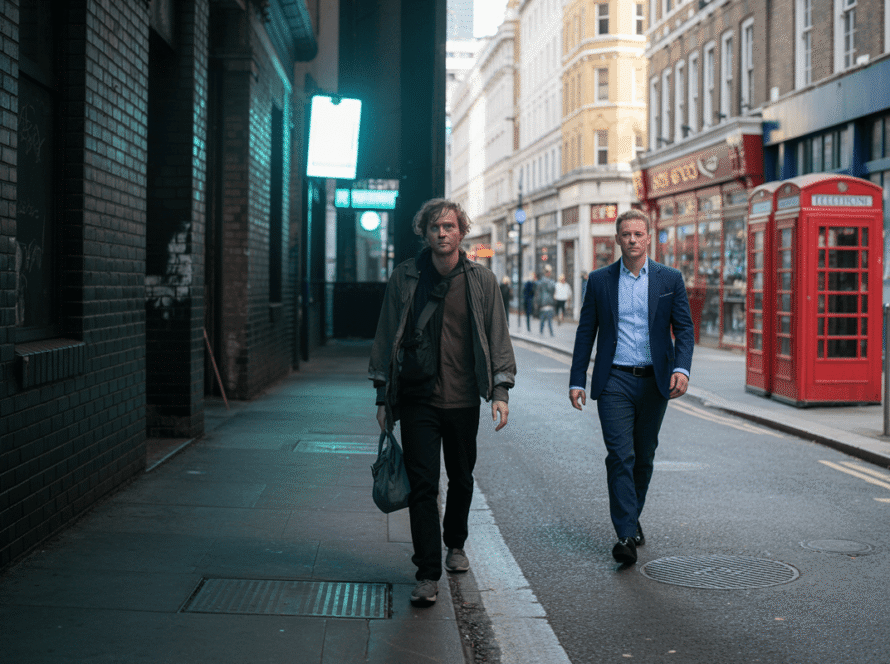Poor decision-making under pressure costs London entrepreneurs £2.3 billion annually—but the most successful startup founders have discovered a systematic approach to making better business decisions even when the stakes are sky-high.
Last week, a fintech founder called me after making a decision that nearly destroyed his company. Facing investor pressure and a competitor’s aggressive move, he’d pivoted his entire product strategy in 48 hours without proper analysis.
The result? Six months of development wasted and £400,000 in lost funding.

His story illustrates a critical challenge facing every London entrepreneur: how do you make effective business decisions when the pressure is relentless and the stakes are sky-high?
As London’s business coach specialising in high-pressure decision-making, I’ve seen brilliant entrepreneurs make costly mistakes simply because they lacked a systematic approach to decision-making under pressure.
The good news? Decision-making is a skill that can be systematically improved.
“Before working with Trip, I would second-guess every major decision for weeks. Now, I use his RAPID framework and make confident choices in hours instead of months. My startup’s velocity increased dramatically.” – Sarah Chen, FinTech Founder, London.
Why London Entrepreneurs Face Unique Decision-Making Pressures
The London Business Environment Amplifies Decision Pressure
London’s position as Europe’s business capital creates decision-making challenges that don’t exist elsewhere:
Investor proximity and expectations: With more venture capital firms per square mile than anywhere in Europe, London entrepreneurs face constant scrutiny and pressure for rapid decisions.
Global market pressures: Operating across multiple time zones means decisions often can’t wait for “normal” business hours. Asian markets open while you’re making strategic choices that affect US operations.
Talent competition: London’s competitive job market means hiring decisions carry enormous weight—a poor choice can set you back months in a fast-moving startup environment.
Regulatory complexity: Navigating UK and EU regulations while maintaining global competitiveness requires nuanced decision-making that strikes a balance between compliance and innovation.

The Cost of Decision Paralysis for London Entrepreneurs
Research shows that decision paralysis costs the average London startup £180,000 annually through missed opportunities, delayed product launches, and extended time-to-market.
Common consequences include:
Missed funding windows: Investors move quickly—hesitation often means losing to more decisive competitors.
Product launch delays: Over-analysis of market conditions while competitors gain first-mover advantage.
Talent acquisition failures: Top candidates rarely wait for lengthy decision processes.
Market opportunity loss: London’s fast-moving business environment punishes slow strategic decision-making for business owners.
The Neuroscience Behind Decision-Making Under Pressure
Why Pressure Destroys Decision Quality
Understanding the science behind pressure decision-making helps entrepreneurs develop better strategies:
Cortisol impairs cognitive function: High-pressure situations flood your brain with stress hormones, reducing your ability to think clearly and consider multiple options.
Narrowed attention: Under pressure, your brain focuses on immediate threats rather than long-term strategic thinking, leading to short-sighted decisions.
Increased emotional reactivity: Stress activates the amygdala, making you more likely to make emotional rather than rational choices.
Reduced working memory: Pressure situations limit your ability to hold multiple variables in mind simultaneously, which is essential for making complex business decisions.
How Startup Founders Can Make Better Decisions
Successful entrepreneurs must strike a balance between speed and accuracy. Move too slowly, and opportunities disappear. Move too quickly, and poor decisions destroy value.
The solution isn’t to eliminate pressure—it’s to develop frameworks that maintain decision quality even under extreme pressure.
The RAPID Framework: Strategic Decision-Making for London Entrepreneurs
After working with hundreds of London entrepreneurs, I’ve developed the RAPID framework specifically for high-pressure business environments:
R – Recognise the Decision Type
Not all decisions deserve equal energy. Categorise each decision:
Type 1 (Irreversible): Major strategic pivots, key hiring decisions, significant funding choices. These require your complete framework process.
Type 2 (Reversible): Product features, marketing experiments, operational adjustments. These benefit from rapid testing and iteration.
Type 3 (Routine): Daily operational choices, minor resource allocation. These should be delegated or systematised.
London application: In London’s fast-paced environment, entrepreneurs often treat Type 2 decisions like Type 1, causing unnecessary delays.
A – Assess Available Information
Quality decisions require quality data, but perfect information doesn’t exist. Follow the 70% rule:
Gather sufficient information to be 70% confident in your choice. Beyond this point, additional research usually provides diminishing returns while consuming valuable time.
Key information sources for London entrepreneurs:
- Market data from London-specific business networks
- Regulatory guidance from UK business advisors
- Competitor intelligence from industry connections
- Financial projections based on London market conditions
Common mistake: Waiting for 100% certainty in an environment where conditions change rapidly.
P – Prioritise Core Objectives
Every decision should advance your primary business objectives. Define these clearly:
Revenue impact: How does this decision affect immediate and long-term revenue?
Strategic alignment: Does this choice support your core business strategy?
Resource efficiency: What’s the opportunity cost compared to alternative choices?
Risk tolerance: Does this align with your acceptable risk levels?
I – Involve the Right Stakeholders
Effective stakeholder involvement improves decision quality while building buy-in:
Decision maker: Identify who has final authority—usually the founder in early-stage companies.
Information providers: Team members with relevant expertise or market knowledge.
Implementation partners: Those who will execute the decision.
Advisory input: Mentors, advisors, or coaches who provide an external perspective.
London advantage: Leverage London’s extensive business networks for advisory feedback and market validation.
D – Decide and Document
Decide within your predetermined timeframe and document your reasoning:
Decision rationale: Why did you choose this option?
Expected outcomes: What results do you anticipate?
Success metrics: How will you measure whether the decision was correct?
Review timeline: When will you evaluate the effectiveness of the decision?
Documentation prevents second-guessing and provides valuable learning for future decisions.
“The RAPID framework transformed how I approach major decisions. Instead of endless analysis paralysis, I now have clear criteria and timelines. My team respects the process, and our execution speed doubled.” – Marcus Thompson, SaaS Founder, London
Pressure-Tested Techniques for Better Business Decisions
The 10-10-10 Rule for Entrepreneur Decision-Making
When facing difficult choices, ask:
How will I feel about this decision in 10 minutes from now? (Immediate emotional reaction)
How will I think about this decision in 10 months? (Medium-term business impact)
How will I think about this decision in 10 years? (Long-term strategic alignment)

This technique helps balance short-term pressures with long-term vision—crucial for London entrepreneurs navigating investor expectations while building sustainable businesses.
The Devil’s Advocate Protocol
Before finalising major decisions, actively seek contrary perspectives:
Assign someone to argue against your preferred choice. Research competitors who made different decisions in similar situations. Identify potential failure modes and mitigation strategies.
London networking advantage: The city’s dense business community provides excellent sources for alternative viewpoints and market validation.
The Decision Journal Method
Track your major decisions to improve future decision-making:
Record your reasoning, expected outcomes, and confidence levels. Review quarterly to identify patterns in your decision-making accuracy. Adjust your process based on what works best for your business type and personality.
Many successful London entrepreneurs utilise decision journals to accelerate their learning and enhance their strategic thinking.
Strategic Decision-Making for Business Owners: Managing Decision Fatigue
Understanding Decision Fatigue for Entrepreneurs

Decision fatigue reduces the quality of choices throughout the day. London entrepreneurs face particularly high decision loads due to:
Constant investor and stakeholder communications requiring responses. Multiple time zone operations demanding decisions across extended hours. Regulatory and compliance choices unique to UK business operations.
Strategies to Combat Decision Fatigue
Batch similar decisions: Group related choices into specific time blocks rather than addressing them randomly throughout the day.
Create decision criteria: Establish clear frameworks for routine choices to reduce cognitive load.
Delegate appropriately: Trust team members with decisions that fall within their expertise and authority levels.
Protect peak energy: Schedule your most important decisions during your periods of highest energy.
Understanding how to avoid burnout while maintaining decision quality becomes crucial for sustained entrepreneurial success.
London-Specific Decision-Making Scenarios
Scenario 1: Funding Round Decision Under Pressure
Situation: Multiple term sheets with 48-hour response deadlines during London Tech Week.
RAPID application:
- Recognise: Type 1 decision requiring complete process
- Assess: Compare terms, validate investor reputations, assess strategic value
- Prioritise: Align with growth objectives and maintain control preferences
- Involve: Legal counsel, existing advisors, mentor network
- Decide: Choose based on long-term strategic fit, not just valuation
Scenario 2: Competitive Response in London Market
Situation: Major competitors launch competing products targeting your key London clients.
Framework application:
- Avoid reactive pivoting without proper analysis
- Assess market response and customer feedback systematically
- Consider multiple response options beyond direct competition
- Involve sales and product teams in strategy development
- Document decision rationale for future reference
Scenario 3: Talent Acquisition During Brexit Uncertainty
Situation: A key technical hire is available, but visa complications arise due to regulatory changes.
Decision approach:
- Recognise this affects long-term capabilities beyond immediate needs
- Assess regulatory risks and alternative solutions
- Prioritise technical capabilities against compliance complexity
- Involve legal advisors and HR specialists
- Decide with clear contingency plans for different regulatory scenarios
When to Seek Professional Support for Decision-Making
Recognising Decision-Making Blind Spots
Even experienced entrepreneurs benefit from external perspectives on significant decisions. Consider professional coaching when:
Pattern recognition: You notice repeated poor outcomes from similar decision types.
Stakeholder feedback: Team members or advisors express concerns about your decision-making process.
High-stakes situations: Decisions that could significantly impact business survival or growth trajectory.
Analysis paralysis: Difficulty moving forward despite adequate information.
Many entrepreneurs find that recognising early warning signs helps them seek support before decision-making problems become critical.
The ROI of Decision-Making Coaching
Professional decision-making coaching typically delivers 300-500% ROI through:
Improved decision accuracy, reducing costly mistakes. Faster decision-making increases competitive advantage. Better stakeholder alignment improves implementation success and enhances confidence in high-pressure situations.
For growing companies, understanding how to scale successfully while maintaining decision quality becomes essential for long-term success.
Implementing Your Decision-Making Improvement Plan
Week 1: Assessment and Framework Adoption
Audit your recent major decisions using the RAPID framework retrospectively. Identify which types of decisions cause you the most difficulty or delay. Begin implementing the 10-10-10 rule for upcoming choices.
Week 2: System Implementation
Create decision templates for your most common choice types. Establish protocols for stakeholder involvement and protocols for different decision categories. Start your decision journal with current major choices.
Week 3: Pressure Testing
Apply your framework to smaller decisions to build confidence and refine the process. Practice the devil’s advocate protocol with trusted team members or advisors. Monitor your decision fatigue patterns throughout typical business days.

Week 4: Optimisation and Scaling
Review your decision journal for patterns and insights. Adjust your framework based on what works best for your business context. Train key team members in your decision-making protocols to improve overall organisational effectiveness.
Frequently Asked Questions About Entrepreneur Decision-Making
How do I balance speed with accuracy in business decisions?
Use the 70% rule—gather enough information to be 70% confident, then decide. Perfect information rarely exists in entrepreneurial environments, and the cost of delay often exceeds the risk of imperfect information.
What’s the biggest mistake London entrepreneurs make in decision-making?
Treating all decisions as equally important. This leads to decision fatigue and delays in routine choices while rushing through critical strategic decisions, categorising decisions by reversibility and importance.
How can I improve my intuition for business decisions?
Intuition improves through experience and reflection. Keep a decision journal to track outcomes and identify patterns. Your “gut feeling” is often your subconscious processing subtle patterns your conscious mind hasn’t recognised.
Should I always involve my team in major decisions?
Involve stakeholders in information gathering and perspective sharing, but maintain clear accountability for final decisions. Too many decision-makers can lead to paralysis, while too few can result in poor information and low buy-in.
How do I handle pressure from investors to make quick decisions?
Communicate your decision-making process clearly and set appropriate expectations. Most experienced investors prefer thoughtful decisions over hasty ones. When facing artificial urgency, assess whether the pressure serves your business interests or theirs.
What role should emotions play in business decision-making?
Emotions provide valuable information but shouldn’t dominate rational analysis. Acknowledge emotional responses while ensuring your decision framework includes objective criteria and stakeholder input.
Your Decision-Making Mastery Starts Now
Effective decision-making under pressure isn’t a talent—it’s a systematic skill that can be developed and refined.
London’s entrepreneurial environment will continue presenting high-pressure decision scenarios. The entrepreneurs who thrive are those who develop robust frameworks for maintaining decision quality regardless of external pressures.
The RAPID framework and supporting techniques in this guide provide a foundation for better business decisions. However, mastery comes through consistent application and continuous improvement.
For female entrepreneurs in London facing additional decision-making pressures, developing systematic approaches becomes even more crucial for long-term success.
Don’t let poor decisions under pressure derail your entrepreneurial success.
If you’re ready to master decision-making under pressure and accelerate your business growth, I’m here to help. As a London business decision coach specialising in entrepreneur frameworks, I help founders develop decision-making systems that work under real-world pressure.
🚀 Limited spots available: Executive Decision-Making Mastery sessions for London entrepreneurs this month.
Book your complimentary Strategic Decision Assessment and discover how to make better business decisions under any pressure.
Your competitive advantage starts with your next decision.





